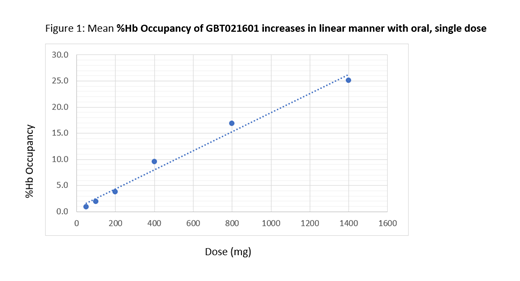Abstract
Background: Sickle cell disease (SCD) is caused by polymerization of sickle hemoglobin (HbS), resulting in red blood cell (RBC) sickling, RBC destruction, vaso-occlusion and end-organ damage. GBT021601 is an oral, small molecule, next-generation HbS polymerization inhibitor. Similar to voxelotor, the first generation HbS polymerization inhibitor, GBT021601 increases hemoglobin-oxygen (Hb-O2) affinity and stabilizes hemoglobin (Hb) in the oxy-hemoglobin (oxyHb) state, thereby inhibiting polymerization of HbS in RBCs. The fraction of Hb bound to drug - (Hb occupancy) approximates the oxyHb molecules per RBC. Compared to voxelotor, GBT021601 has the potential to achieve higher Hb occupancies. GBT021601 achieves greater exposures per dose and is more potent as measured by improvements in hematological parameters in an in vivo SCD mouse model (Dufu, Kobina 2020). We hypothesized that GBT021601 would achieve a substantial reduction in RBC hemolysis and increase in hemoglobin while maintaining a favorable safety profile. We therefore explored safety, tolerability, pharmacokinetics (PK) and pharmacodynamics (PD) in healthy volunteer participants (HVs) and adults living with SCD.
Methods: Two studies are in progress: 1) the first in human (FIH), randomized, double-blind, placebo-controlled, parallel group phase 1 study for HVs ages 18-55 years; and 2) a single arm, intrapatient single dose and multiple ascending dose study in homozygous HbSS SCD patients ages 18-60 years with baseline Hb levels ≥5.5 g/dL and ≤10.5 g/dL and without vaso-occlusive crisis or transfusion within 30 days of screening. The HV study tests single ascending doses (SAD) with a 6:2 randomization ratio. Doses administered to HV cohorts ranged from 50 mg to 2200 mg. The SCD patient study tests a single dose (100 mg) followed by multiple ascending doses of the study drug in the same patients to reach a % Hb occupancy of >20-30% over 7 weeks. The primary endpoints for both studies are safety and tolerability. Secondary endpoints include PK and PD. For the patient study, additional secondary endpoints are confirmation of the relationship between time matched GBT021601 concentrations and the change from baseline of clinical measures of anemia and hemolysis. Hb occupancy is calculated as a percentage of the molar ratio of drug concentrations in RBCs to the estimated Hb concentrations (using MCHC) in RBCs.
Results: As of July 22, 2021, 63 HVs and 6 adults with SCD were enrolled. Thirty-nine HVs completed the study; one discontinued due to moving to a new geographical area and 23 were in follow-up. GBT021601 was generally well-tolerated, most adverse events (AE) were Grade 1 and 2, there were no deaths, and there was one serious adverse event in a HV that was not related to the study drug. There were no AEs indicative of tissue hypoxia. GBT021601 showed linear PK, high partitioning into RBCs, and a dose dependent increase in percent hemoglobin occupancy in HVs (Figure 1). From single doses of 50 to 1400 mg, the mean preliminary % Hb occupancy ranged from 0.88 to 25%, respectively, exceeding the Hb occupancies reported for HV receiving single doses of voxelotor over a similar range (Putz, 2017).
Six adults with SCD have received a single 100 mg dose of GBT021601 and the dose has been well tolerated. Multiple-dose data in adults will be presented.
Conclusions: Single doses of GBT021601 are well tolerated in HV and adults with SCD. Given its drug exposure, GBT021601 has the capacity to achieve a targeted Hb occupancy and attain the desired hematological effect at low doses, therefore reducing pill burden and improving clinical outcomes for individuals living with SCD. Forthcoming multiple-dose data will help to evaluate GBT021601's potential as a best-in-class, oral, disease-modifying therapy for SCD.
Funding: This study was supported by Global Blood Therapeutics.
Brown: Pfizer: Research Funding; Imara: Consultancy, Research Funding; Novartis: Consultancy, Research Funding; Forma Therapeutics: Research Funding; Novo Nordisk: Consultancy; Global Blood Therapeutics: Consultancy, Research Funding. Redfern: Eisai: Other: Advisory Board; Linear Clinical Research: Current Employment; Pfizer: Other: Advisory Board; Novartis: Other: Advisory Board; Astra Zeneca: Other: Advisory Board; Roche: Other: Advisory Board. Lisbon: Global Blood Therapeutics: Current Employment. Washington: Global Blood Therapeutics: Consultancy. Agodoa: Global Blood Therapeutics: Current Employment, Current equity holder in publicly-traded company. Smith-Whitley: Global Blood Therapeutics: Current Employment.


